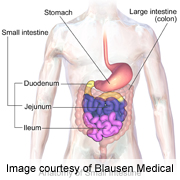
WEDNESDAY, Aug. 28 (HealthDay News) — The way that the intestine “tastes” sweet foods may be defective in people with type 2 diabetes, leading to problems with glucose (sugar) uptake, a new study says.
This is the first such finding about the “sweet taste receptors” in the intestine and could prove important for a number of health and nutrition problems experienced by diabetes patients, according to the researchers at the University of Adelaide in Australia.
They explained that taste buds in the mouth aren’t the only way that the body detects sweetness.
“When we talk about ‘sweet taste’, most people think of tasting sweet food on our tongue, but scientists have discovered that sweet taste receptors are present in a number of sites in the human body. We’re now just beginning to understand the importance of the sweet taste receptors in the human intestine and what this means for sufferers of type 2 diabetes,” Richard Young, senior postdoctoral researcher in the nerve-gut research laboratory, said in a university news release.
The study included 14 healthy adults and 13 adults with type 2 diabetes.
Young found that the control of sweet taste receptors in the intestine of healthy adults allowed their bodies to regulate glucose uptake 30 minutes after the receptors detected glucose. However, people with type 2 diabetes had abnormalities that resulted in more rapid glucose uptake, according to the study published in a recent issue of the journal Diabetes.
“When sweet taste receptors in the intestine detect glucose, they trigger a response that may regulate the way glucose is absorbed by the intestine. Our studies show that in diabetes patients, the glucose is absorbed more rapidly and in greater quantities than in healthy adults,” Young said.
“This shows that diabetes is not just a disorder of the pancreas and of insulin — the gut plays a bigger role than researchers have previously considered,” he said. “This is because the body’s own management of glucose uptake may rely on the actions of sweet taste receptors, and these appear to be abnormally controlled in people with type 2 diabetes.”
Further research is needed to learn more about these mechanisms in the intestines, Young said.
More information
The U.S. National Institute of Diabetes and Digestive and Kidney Diseases has more about type 2 diabetes.
Copyright © 2026 HealthDay. All rights reserved.

